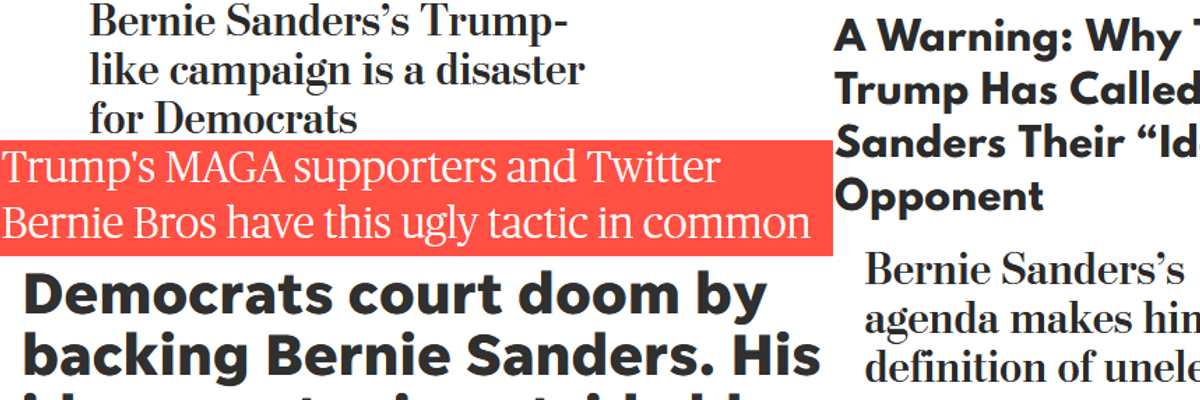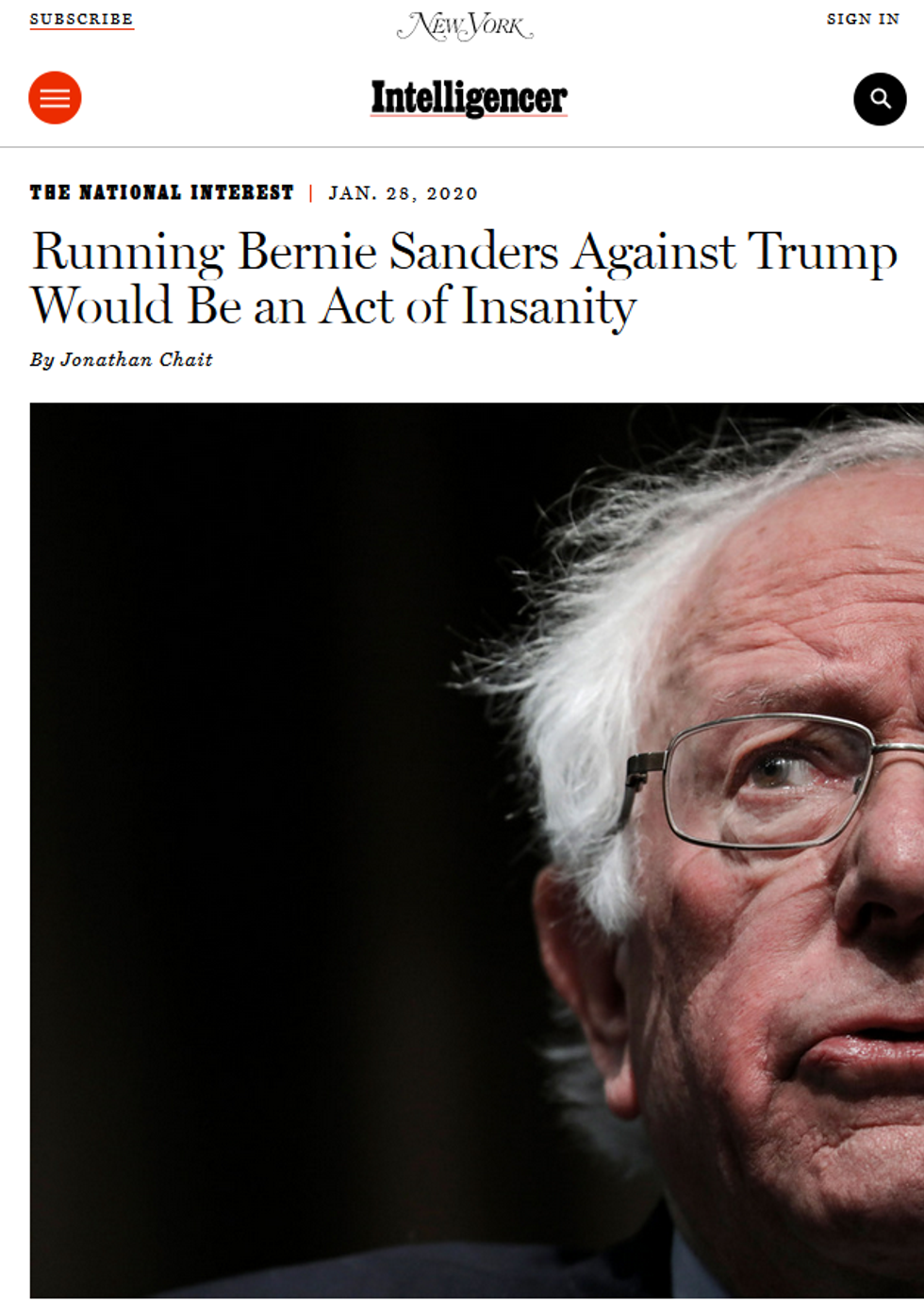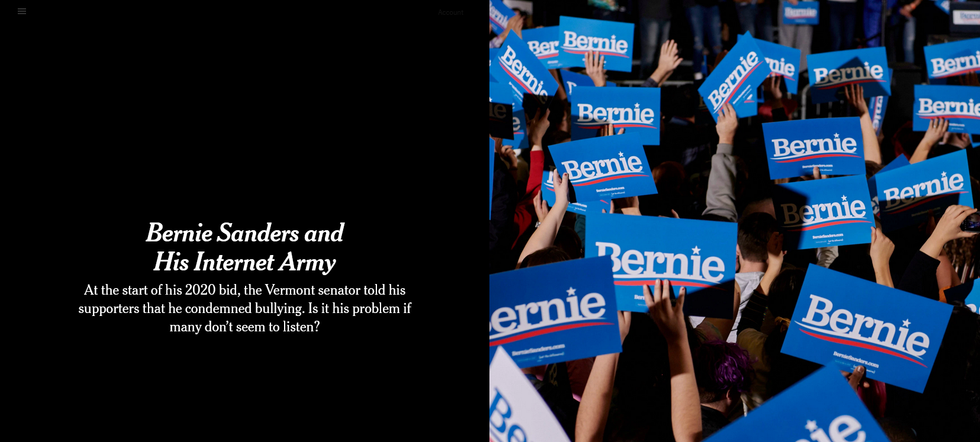As the Iowa caucuses approach, corporate media are beginning to panic.
"Running Bernie Sanders Against Trump Would Be an Act of Insanity," insisted Jonathan Chait in New York magazine (1/28/20). The New York Times' Paul Krugman (1/20/20)--among many others (FAIR.org, 1/24/20)--revived the 2016 media trend of tarring Sanders as "Trumpian."
The Never Trumper holdouts--an increasingly endangered species--are as scared as the establishment Democrats. "Bernie Can't Win," David "Axis of Evil" Frum wrote pleadingly in the Atlantic (1/27/20). "Bernie Sanders's Trump-Like Campaign Is a Disaster for Democrats," cried the Washington Post's Jennifer Rubin (1/27/20). "Anyone But Trump? Not So Fast," counseled the New York Times' Bret Stephens (1/24/20).
The Wall Street-funded Democratic think tank Third Way has also pulled out all the stops against Sanders' rise--with media's help. The group put out "A Warning" to Iowa Democrats (1/28/20), advising them that,
because of media negligence and the strategic calculation of his rivals, you have not seen much real exploration of the politically toxic background and ideas of the current polling leader in Iowa and a national co-frontrunner.
The memo proceeded to offer a lengthy list of ways Trump would attack Sanders--an easy list for them to compose, since some of them, such as that he'll be called a socialist and that Medicare for All is unpopular, are ones the Third Way itself has used to attack Sanders.
The media have been happy to offer a platform for this message. The Washington Post recently gave Third Way an op-ed column (1/15/20) to make its case that "Bernie Sanders's agenda makes him the definition of unelectable." USA Today (1/29/20) likewise gave Third Way leaders space to charge, "Democrats Court Doom by Backing Bernie Sanders. His Ideas Are Toxic Outside Blue America." And the group has been popping up in the latest round of centrist-source articles (among other usual suspects, like Rahm Emanuel and James Carville), in which establishment sources make unsubstantiated claims that reporters pass on without comment.
One of these ideas is that Sanders has flown under the radar, evading attacks or scrutiny from both his opponents and the media. "It's past time for other Democrats to come off the sidelines and for the media to start doing its job to vet a serious contender for the nomination," Third Way's Matt Bennett told NBCNews.com (1/25/20) in an article headlined, "'Oh My God, Sanders Can Win': Democrats Grapple With Bernie Surge in Iowa." In Politico (1/27/20), he ratcheted up the rhetoric: "[The media] let him get away with murder. They let him bluster past hard questions."

Not all media observers agreed. In a bizarre "do they have an editor" moment, the Washington Post (1/26/20) published two news articles making opposite observations: "Bernie Sanders Faces Barrage of Attacks From Rivals as Polls Point to Surge in Early-Voting States" and "Rivals Aren't Throwing a Lot of Roadblocks in Front of Sanders." The former, by Chelsea Janes and Sean Sullivan, pointed to recent interviews and campaign messaging coming from Sanders' opponents that target him. The latter, by David Weigel, reported on some of the same evidence, but came to the opposite conclusion, because some of the attacks were made in venues without a broad reach (a South Carolina newspaper, a campaign email) and some were ineffective. (Many "voters were unmoved" by Biden and Klobuchar's attacks on Sanders as "upending the Obama legacy.")
The Weigel piece argued that,
All of Sanders's rivals spend time, sometimes after a worried voter asks for it, explaining how they will pay for their plans without busting the budget. Sanders does not get these questions and spent months at town halls where he asked voters to describe their crises -- health-care bills, student debt -- so he could explain why only an unfair economy would even allow the problems to exist.
To set the record straight: Sanders has gotten a great deal of media scrutiny and pushback, as FAIR noted back in 2016 (5/25/16) and David Sessions (New Republic, 1/28/20) has usefully updated. Sessions wrote:
The notion that Sanders is sailing toward primary victories with nary a soul bothering to pose a question about his record or electability is a relic of the 2016 Democratic primary, when Hillary Clinton and her supporters grew frustrated with his durable presence in the race and pundits puzzled over the fact that Sanders polled better against Donald Trump. The common explanation settled on was that Sanders's popularity was a mirage resting on his lack of scrutiny. But it's hard to square that conventional wisdom with the written record--a compendium of "vetting" so varied and substantial that it raises the question as to whether the people who need vetting the most are those who continue to call for it long after their needs have been met.
Another line of attack is the revival of the "Bernie Bro" as a means to discredit the Sanders campaign. A central trope of the 2016 campaign, based on anecdotal evidence and repeated endlessly by Clinton supporters and journalists, the idea that Sanders supporters are predominantly white, male and viciously offensive on social media lingers on--despite its utter lack of basis in reality.
As all journalists and most of the rest of the world know, the internet is awash in vile rhetoric coming from all directions, not just from a small subset of Sanders supporters. As Glenn Greenwald put it (Intercept, 1/31/16):
There are literally no polarizing views one can advocate online -- including criticizing Democratic Party leaders such as Clinton or Barack Obama -- that will not subject one to a torrent of intense anger and vile abuse.... Pretending that abusive or misogynistic behavior is unique to Sanders supporters is a blatant, manipulative scam.
In fact, a March 2016 study found that, among voters, Sanders supporters were perceived as much less "aggressive and/or threatening online" (16%) than were Clinton supporters (30%), who in turn were perceived as much less so than Trump supporters (57%).
And yet the media persist with the trope. In the New York Times ( 1/27/20), this came as a lengthy front-page article headlined:
Bernie Sanders and His Internet Army: At the Start of His 2020 Bid, the Vermont Senator Told His Supporters That He Condemned Bullying. Is It His Problem if Many Don't Seem to Listen?
In the Daily Beast (1/22/20), the headline was "Bernie Bros Are Loud, Proud, and Toxic to Sanders' Campaign." And the headline of an NBCNews.com (1/19/20) column announced, "Trump's MAGA Supporters and Twitter Bernie Bros Have This Ugly Tactic in Common: Bernie Twitter Operates Under the Self-Righteous Guise of Being the True Progressives of the Internet. But Their Harassing Tactics Are Anything but Progressive."
These pieces continue the trend of cherry-picking evidence and moving seamlessly between accusations of death threats and examples that hardly qualify as abuse (The closing piece of evidence in the New York Times: "Some of you millionaires need to realize that many of us actually *need* Bernie Sanders to win the presidency," one account replied. "We can't just 'chill.'").
In the Times piece, reporters Matt Flegenheimer, Rebecca R. Ruiz and Nellie Bowles regurgitated the completely unsubstantiated claim of chair-throwing at the 2016 Nevada convention (rated "false" by Snopes, but eagerly repeated across the media) and combined it with "a torrent of menacing messages" to the state party chair to justify associating Sanders' campaign with violence: "In person, serious violence has been avoided, it seems, though there have been occasional low-grade clashes."
Meanwhile, rivals are given the opportunity to cast blame on Sanders, again with no evidence. For instance, a strategist for both Obama and Clinton is quoted saying that Sanders "had empowered aides and surrogates who 'have a tendency to aggressively amplify things that a campaign would normally shut down amongst supporters.'"
No evidence is supplied, unless you count the example given later in the article in which prominent Sanders supporter Shaun King tweeted that the Warren campaign "leaked this attack against Bernie to the press for political gain," and that Warren staffers had told him that Warren "routinely embellishes stories." The outcome, according to the Times? The Sanders campaign manager told King to stop; "but by then, much of the Sanders-aligned internet was about to begin tweeting snakes at Ms. Warren and her supporters en masse."
In other words, the campaign did not empower King; they shut him down. But notice how King's tweets are nonetheless held responsible for "the Sanders-aligned internet" that was "about to begin" tweeting snakes--and then Sanders' campaign is apparently held responsible by association.
Hillary Clinton jumped into the fray with guns blazing in the Hollywood Reporter (1/21/20). When asked if she would endorse and campaign for Sanders if he got the nomination, her response was evasive but decidedly antagonistic:
I'm not going to go there yet. We're still in a very vigorous primary season. I will say, however, that it's not only him, it's the culture around him. It's his leadership team. It's his prominent supporters. It's his online Bernie Bros and their relentless attacks on lots of his competitors, particularly the women.... I don't think we want to go down that road again where you campaign by insult and attack and maybe you try to get some distance from it, but you either don't know what your campaign and supporters are doing, or you're just giving them a wink and you want them to go after Kamala [Harris] or after Elizabeth [Warren]. I think that that's a pattern that people should take into account when they make their decisions.
The Post's Rubin (1/21/20) drew on this quote and other excerpts from Clinton's Hollywood Reporter interview to paint Sanders as having an "Attack Machine" centered on a "thinly veiled misogyny" that is now supposedly "com[ing] back to haunt him."
The real Sanders attack machine isn't the mythical machine run by Sanders to take down his opponents; it's run by the establishment Democrats and their media counterparts to take down Sanders.
SIDEBAR:
'Menacing' Sanders 'Tightens Grip' by 'Threatening to Seize Control'
The New York Times, in a piece headlined "In Iowa, the 'Not Sanders' Democrats Find Voters Torn" (1/27/20), described Sanders' rise in alarming terms:
Mr. Sanders is threatening to seize control in the early states, taking narrow but clear polling leads in Iowa and New Hampshire and increasingly menacing Mr. Biden's advantage in national polls.
"The liberal Bernie Sanders tightens his grip in Iowa," the piece's subhead warned, using imagery more often used to convey the movement of hostile military forces than to report a politician's favorable polling results.





